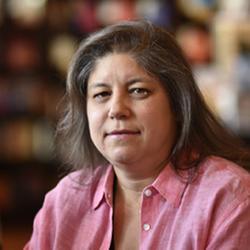Among the book world people who testified yesterday at a hearing before the U.S. International Trade Commission about proposed tariffs on Chinese goods was Jamie Fiocco, president of the American Booksellers Association and owner of Flyleaf Books, Chapel Hill, N.C. In her prepared remarks, she said in part:
 |
|
| Jamie Fiocco | |
"ABA understands the Administration's serious concerns with China's failure to protect intellectual property and the related issues of forced technology transfers that are being discussed here. However, ABA believes imposing tariffs on books is a clear reversal of decades of U.S. policy that exempts books and other written material from trade restrictions, and to make this change would undercut important American policy interests. In addition, imposing tariffs on books would seriously and disproportionately damage U.S. small and medium sized businesses, like my bookstore, and consumers.
"It is crucial to understand that even the most successful of independent bookstores operate on the thinnest of margins. And despite growth and success in recent years, bookselling is a highly volatile business. If prices increase due to an increase in tariffs, the negative impact on the fiscal health of the bookselling world--and on readers young and old--would be significant.
"Based on information from publishing colleagues, some 25% of books they publish are printed in China. And the great majority of children's books and texts such as Bibles are printed in China. Not only will the proposed tariff impact what books are available--and affordable--to young readers and their families, it will impact what makes my store, and other stores like mine, unique. In independent bookstores, sections are curated carefully by store owners to fit the needs of the communities in which the indie bookstore resides. Tariffs on book titles would impose significant and unwarranted roadblocks on creating a vibrant, diverse children’s book section, for example. This unfortunate result would impact both my business and the young readers and families in my community in ways that will unquestioningly have long-ranging impact on future readers.
"There is a free expression issue at stake here as well. Any increase in the price of books would limit their sale, thereby limiting the exchange of ideas. The importance of providing affordable books by a diverse range of authors to the residents of communities throughout this country cannot be overstated.
"Simply put: Taxing books would be bad policy. The proposed tariffs under Chapter 49 of the Harmonized Tariff Schedule would inflict harm on our customers--a diverse community of readers. Imposing tariffs also would undercut fundamental American values, such as the First Amendment right of every citizen to have access to a wide range of diverse voices and writings.
"Any tariff on printed books, regardless of genre or title, would be a tax on every reader, whether they are community members who buy books in our store, or whether they are school districts seeking to provide titles for students. It will drive up the cost of books for everyone who reads. In many cases, especially in poorer areas, it may be the difference between whether a book is affordable to a reader or not. The long-term deleterious impact that this could have would be significant. It will also disproportionately damage both U.S. businesses and consumers, as well as critical priorities and values for our country."

